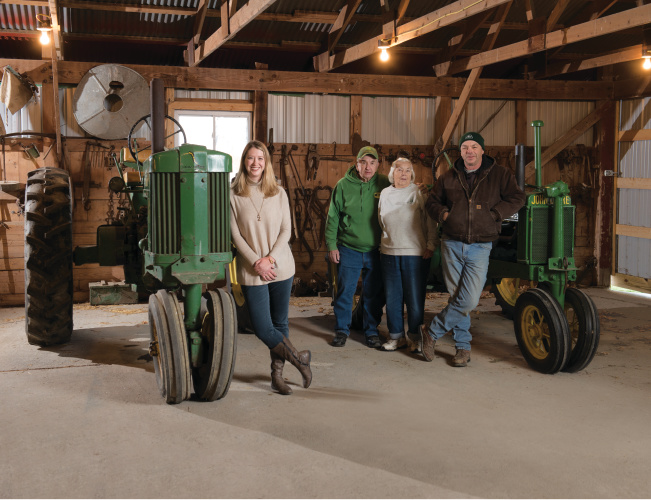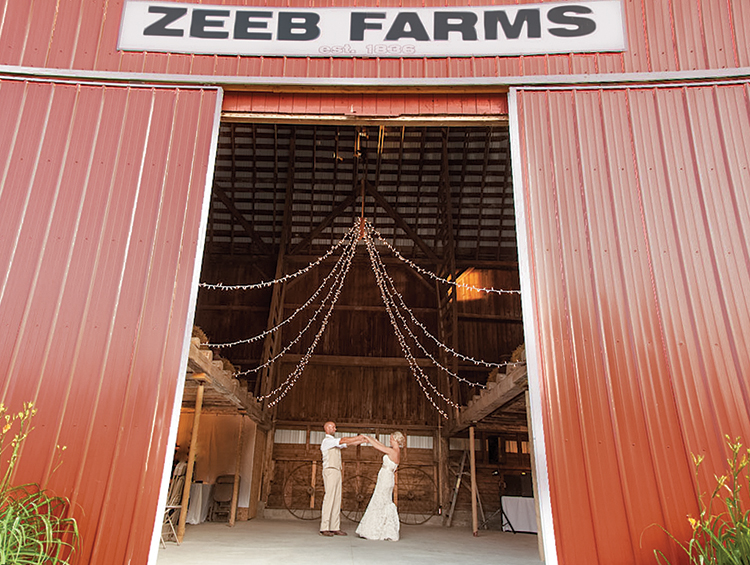Home > Michigan > Michigan Farm to Table > Michigan Farm was a Century in the Making
Michigan Farm was a Century in the Making
In partnership with: Michigan Department of Agriculture & Rural Development
 Bob Zeeb’s grandson got married in his farm’s 1928 hip-roof barn, where 200 guests dined and danced afterward. A granddaughter celebrated her wedding reception on the farm, too, and another grandchild treasures wedding photos captured on the farmstead. In the spirit of weddings, the farm’s 19th century house remarkably represents a wedding gift to his grandfather in 1897.
Bob Zeeb’s grandson got married in his farm’s 1928 hip-roof barn, where 200 guests dined and danced afterward. A granddaughter celebrated her wedding reception on the farm, too, and another grandchild treasures wedding photos captured on the farmstead. In the spirit of weddings, the farm’s 19th century house remarkably represents a wedding gift to his grandfather in 1897.
For more than 175 years, Zeeb Farms has been threaded with the lives of eight generations of family – near and far. “I remember a conversation with our daughter, who is the only one of our kids who doesn’t live on the farm anymore,” says Bob Zeeb, who owns the farm with his wife, Virginia. “I asked her, ‘Once we’re gone, what share do you want?’ She said, ‘Part of the farm.’ Even though she’s been gone all of her adult life with her husband, who served in the Navy, she wants to stay tied to the farm.”
That decision supports a lengthy heritage. Zeeb’s great- great-grandfather, Russell Cushman, bought the farm’s original 80 acres in 1837 near Bath, northeast of Lansing. The farm has since grown to include nearly 1,000 contiguous acres. ![Michigan centennial farm [INFOGRAPHIC]](https://eadn-wc01-4177395.nxedge.io/wp-content/uploads/2020/05/Screen-Shot-2016-04-12-at-3.55.37-PM-740x633.jpg) Zeeb Farms represents one of more than 6,000 farms in Michigan with Centennial Farm status, says Nancy Feldbush, director of communications for the Historical Society of Michigan. The organization certifies working farms that have remained in the same family for at least 100 years and honors their contributions to Michigan’s development. Michigan’s electrical utility companies fund the official green and yellow centennial markers, which is a way for the companies to commemorate the dramatic changes electricity brought to farms and rural life. Coincidentally, the old Zeeb farmhouse dining room still contains the original light fixture from when electricity arrived there in the late 1930s.
Zeeb Farms represents one of more than 6,000 farms in Michigan with Centennial Farm status, says Nancy Feldbush, director of communications for the Historical Society of Michigan. The organization certifies working farms that have remained in the same family for at least 100 years and honors their contributions to Michigan’s development. Michigan’s electrical utility companies fund the official green and yellow centennial markers, which is a way for the companies to commemorate the dramatic changes electricity brought to farms and rural life. Coincidentally, the old Zeeb farmhouse dining room still contains the original light fixture from when electricity arrived there in the late 1930s.
![Michigan centennial farm [INFOGRAPHIC]](https://eadn-wc01-4177395.nxedge.io/wp-content/uploads/2020/05/Screen-Shot-2016-04-12-at-3.55.37-PM-740x633.jpg) Zeeb Farms represents one of more than 6,000 farms in Michigan with Centennial Farm status, says Nancy Feldbush, director of communications for the Historical Society of Michigan. The organization certifies working farms that have remained in the same family for at least 100 years and honors their contributions to Michigan’s development. Michigan’s electrical utility companies fund the official green and yellow centennial markers, which is a way for the companies to commemorate the dramatic changes electricity brought to farms and rural life. Coincidentally, the old Zeeb farmhouse dining room still contains the original light fixture from when electricity arrived there in the late 1930s.
Zeeb Farms represents one of more than 6,000 farms in Michigan with Centennial Farm status, says Nancy Feldbush, director of communications for the Historical Society of Michigan. The organization certifies working farms that have remained in the same family for at least 100 years and honors their contributions to Michigan’s development. Michigan’s electrical utility companies fund the official green and yellow centennial markers, which is a way for the companies to commemorate the dramatic changes electricity brought to farms and rural life. Coincidentally, the old Zeeb farmhouse dining room still contains the original light fixture from when electricity arrived there in the late 1930s.
Lasting Legacy
Zeeb Farms earned the title of 2015 Outstanding Centennial Farm of the Year for its rich history and successful farm management. The farm progressed through wars, economic hardships and grueling manual labor. It gained indoor plumbing and electricity. And Zeeb remembers the farm’s first modern tractor, a 1936 John Deere B, which they still own.
“I enjoy talking to my great- grandkids about how we used to do things,” Zeeb says. “I remember our grandpa plowing the garden with a horse because he didn’t want a tractor in it.”
The farm touts a documented history of land stewardship practices, from water management and soil conservation to precision technology farming practices, which improve crop production and efficient use of resources.  In fact, Bob was named Soil Conservationist of the Year in 1972. Today, his granddaughter serves on the Clinton Conservation District Board. The family farm’s history lies primarily with dairy cattle, corn and soybeans, which Zeeb and his three sons managed for years. They sold the dairy cows in 1996 and today, his son, Pat, farms full- time and grows corn and soybeans. His son also represents the fourth generation to live in the farm’s 1880s-era house. The Zeebs look to their bicentennial with anticipation. As of 2015, only three Michigan farms held the designation of 200 years of continuous family ownership, says Jordan Stoddard, membership coordinator for the Historical Society of Michigan. Those include the Lewis St. Bernard Farm, established in 1814 in St. Clair County; the Michael Bowerman Farm, started in 1813 in Macomb County; and the de Beausset Farm in Wayne County, founded in 1776. “I think we all have a lot of great memories from growing up here,” says Andrea Polverento, whose father, Pat, farms the Zeeb family land today. “We have a close-knit family. We enjoy getting together, especially when it’s tied to the farm.”
In fact, Bob was named Soil Conservationist of the Year in 1972. Today, his granddaughter serves on the Clinton Conservation District Board. The family farm’s history lies primarily with dairy cattle, corn and soybeans, which Zeeb and his three sons managed for years. They sold the dairy cows in 1996 and today, his son, Pat, farms full- time and grows corn and soybeans. His son also represents the fourth generation to live in the farm’s 1880s-era house. The Zeebs look to their bicentennial with anticipation. As of 2015, only three Michigan farms held the designation of 200 years of continuous family ownership, says Jordan Stoddard, membership coordinator for the Historical Society of Michigan. Those include the Lewis St. Bernard Farm, established in 1814 in St. Clair County; the Michael Bowerman Farm, started in 1813 in Macomb County; and the de Beausset Farm in Wayne County, founded in 1776. “I think we all have a lot of great memories from growing up here,” says Andrea Polverento, whose father, Pat, farms the Zeeb family land today. “We have a close-knit family. We enjoy getting together, especially when it’s tied to the farm.”
 In fact, Bob was named Soil Conservationist of the Year in 1972. Today, his granddaughter serves on the Clinton Conservation District Board. The family farm’s history lies primarily with dairy cattle, corn and soybeans, which Zeeb and his three sons managed for years. They sold the dairy cows in 1996 and today, his son, Pat, farms full- time and grows corn and soybeans. His son also represents the fourth generation to live in the farm’s 1880s-era house. The Zeebs look to their bicentennial with anticipation. As of 2015, only three Michigan farms held the designation of 200 years of continuous family ownership, says Jordan Stoddard, membership coordinator for the Historical Society of Michigan. Those include the Lewis St. Bernard Farm, established in 1814 in St. Clair County; the Michael Bowerman Farm, started in 1813 in Macomb County; and the de Beausset Farm in Wayne County, founded in 1776. “I think we all have a lot of great memories from growing up here,” says Andrea Polverento, whose father, Pat, farms the Zeeb family land today. “We have a close-knit family. We enjoy getting together, especially when it’s tied to the farm.”
In fact, Bob was named Soil Conservationist of the Year in 1972. Today, his granddaughter serves on the Clinton Conservation District Board. The family farm’s history lies primarily with dairy cattle, corn and soybeans, which Zeeb and his three sons managed for years. They sold the dairy cows in 1996 and today, his son, Pat, farms full- time and grows corn and soybeans. His son also represents the fourth generation to live in the farm’s 1880s-era house. The Zeebs look to their bicentennial with anticipation. As of 2015, only three Michigan farms held the designation of 200 years of continuous family ownership, says Jordan Stoddard, membership coordinator for the Historical Society of Michigan. Those include the Lewis St. Bernard Farm, established in 1814 in St. Clair County; the Michael Bowerman Farm, started in 1813 in Macomb County; and the de Beausset Farm in Wayne County, founded in 1776. “I think we all have a lot of great memories from growing up here,” says Andrea Polverento, whose father, Pat, farms the Zeeb family land today. “We have a close-knit family. We enjoy getting together, especially when it’s tied to the farm.” 


